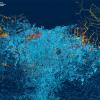
The YSSP is designed for advanced PhD students – ideally about two years prior to completing their PhD – working on a topic that is compatible with ongoing research at IIASA and who wish to explore the policy implications of their work. Participants work under the direct mentorship of experienced IIASA scientists in a unique interdisciplinary and international research environment. As part of their participation, YSSP fellows produce a paper serving as the first step towards a publishable journal article, and have the opportunity to build up contacts for future collaboration within the institute's worldwide network.
Given the research themes of the Economic Frontiers Program presented on the main page and pages of the research groups on Economics of Equal Life Chances (EELC) and Economics of Disruptive Change (EDC), the program especially welcomes applications for the YSSP 2025 surrounding the following topics:
- Research relating to unequal access to essential goods and services and the implications for development opportunities, vulnerability and well-being.
- Distributional impacts of climate and agricultural transitions.
- The modelling of social tipping in dynamic climate systems.
- Household responses to disaster risks.
- Theoretical and empirical modelling relating to the accumulation and allocation of human capital (health and education) and other productive factors (wealth, retirement decisions) in response to transition processes.
- Economic modelling of disruptions (e.g. climate tipping, eco-system collapse, technological breakthrough, pandemics, drastic political change) and resilience.
- Dynamic and game-theoretic modelling of environmental and climate policies as well as in the setting of energy transitions.
- Modeling economic dynamics (e.g., transitional paths, strategic interaction) and analysis of policy implications.
- Modelling of health and health care for well-being and in the process of transitions.
- Modelling of the circular economy and different market structures.
Applicants focusing on other research topics not listed above are still highly encouraged to apply to the Economic Frontiers Program, if the research questions align with the topics covered in the Program.
In terms of methods researchers of the EF Program can offer expertise in
- economic dynamics,
- optimal control and differential game theory,
- overlapping-generations modelling,
- advanced and structural econometrics,
including both theoretical and numerical approaches. Hence, the Program can provide particularly in-depth supervision to students working within these frameworks but also very much welcomes applications based on different methodological approaches.
If your proposed research topic matches the interests and/or methodologies used by the mentors listed below, we invite you to directly contact them already before drafting your application. For general request please contact the EF-CDAT representative Michael Freiberger ([email protected])
EF mentors

Michael Freiberger
Research interests:
- Modeling disaster risk decisions
- Economic modeling of the recycling sector
- Modelling behaviour under stochastic shocks
- Macro-economic aspects of integrated assessment models (IAMs)
- Theoretical health economics
Methodologies:
- Optimal control models (standard and distributed)
- Dynamic optimization (for stochastic and deterministic models)
- Dynamic system modeling
- General and partial equilibrium models

Miguel Sanchez-Romero
Research interests:
- Economic effects of the interaction between demographic changes and intergenerational transfers
- Computable general equilibrium models using realistic demography and National Transfer Accounts (NTA) data
Methodologies:
- General equilibrium model of overlapping generations (CGE-OLG)
- Optimal control
- Population projections
- Demographic modeling

Ibrahim Tahri
Research interests:
- Financial Economics (Asset Pricing and Optimal Asset Allocation) applied to climate finance
- Macroeconomics
- Economics of Climate Change (Energy transition)
Methodologies:
- Dynamic Programming
- Analytical and Numeric
- Finite Difference Method
- Martingale Approach
- Solving PDEs using Deep Neural Networks

Kimi (Ha) Vu
Research interests:
- Environmental, Development and Behavioral Economics
- Impact assessment and Policy evaluation.
Methodologies:
- Applied Econometrics
- Panel data analysis
- Spatial regression
- Difference in difference
- Instrumental variables
- Bartik instrument
- Geospatial-information-system (GIS)
- Micro-simulation.

Stefan Wrzaczek
Research interests:
- Modeling of disruptive changes in environmental economics and (theoretical) models
- Population dynamics
- Energy transition
- Optimal environmental taxation
- Optimal behavior with strategic interaction (market entry and deterrence)
Methodologies:
- Optimal control (standard, age-structured, with random shocks)
- Dynamic optimization
- Dynamic games
Further information on the organizational structure of the YSSP can be found here.
Economic Frontiers YSSP alumni
2024
Amrutha GS
Measuring Health and Economic Consequences of Air Pollution in India: An Empirical Study Investigating the Nexus Between Air Pollution, Health Outcomes and Multifaceted Economic Loss
Jinhyeok Jang
Neighborhood change and well-being disparities: the role of unequal community infrastructure investment
Kunxin Zhu
Waves of change: understanding the impact of natural hazards on housing market dynamics and coastal evolution
2023
Caesar Agula
Socio-demographic heterogeneity in cost of accessing medication abortion: insights from Ghana
Rajdeep Singh
Optimal vaccine allocation strategies
Publication: Singh, R., Wrzaczek, S., & Freiberger, M. (2025). The inoculation dilemma: Partial vs Full immunization during the early rollout in a pandemic. Omega 132 e103230. 10.1016/j.omega.2024.103230.
Huiying Ye
Linking R&D investment to emission reduction cooperation: overcoming free-riding while achieving deep de-carbonization
(co-mentored with ASA)
Mikhalevich Award winner
2022
Andreas Lichtenberger
Analyzing the redistributive effects of different carbon tax policies
Maddalena Muttoni
How to prepare for and adapt to a climate tipping point



